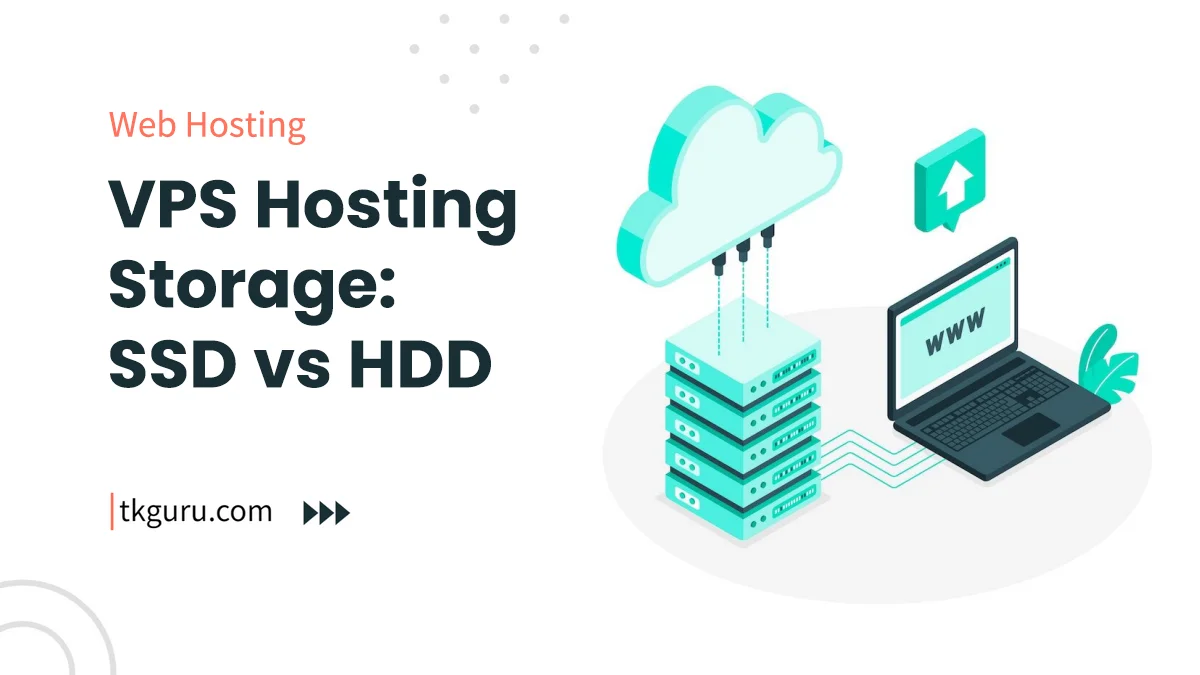Advertisements
Ratings

VPS Hosting Storage Options: SSD vs HDD – In the realm of VPS hosting, storage plays a pivotal role in determining the performance, speed, and reliability of your virtual environment.
When selecting a VPS hosting plan, you’ll encounter two primary storage options: Solid-State Drives (SSDs) and Hard Disk Drives (HDDs).
Each storage type offers distinct advantages and is suited for specific use cases. This article will delve into the SSD vs HDD debate, providing insights into their performance, benefits, and the factors that guide your storage choice.
SSD vs HDD: Performance Comparison: Solid-State Drives (SSDs): SSDs are a modern storage solution that use NAND-based flash memory to store data. Their performance benefits are substantial:
| Performance Metric | SSD Advantage |
|---|---|
| Speed | Significantly faster read/write speeds compared to HDDs. |
| Latency | Minimal latency, leading to quicker data retrieval. |
| IOPS | High Input/Output Operations Per Second, ideal for handling multiple requests simultaneously. |
Hard Disk Drives (HDDs): HDDs, on the other hand, use spinning disks and magnetic platters to store data. While they offer larger storage capacities, their performance is comparatively slower:
| Performance Metric | HDD Advantage |
|---|---|
| Capacity | Higher storage capacities at a lower cost per gigabyte. |
| Cost | Generally more cost-effective for large-scale storage. |
| Longevity | Longer lifespan due to minimal wear and tear. |
Advantages of SSD Hosting: Opting for SSD storage in your VPS hosting environment brings several significant advantages:
- Enhanced Loading Times: SSDs excel at delivering lightning-fast loading times for applications, websites, and databases. This translates to an improved user experience and reduced bounce rates.
- Quick Data Retrieval: The minimal latency of SSDs ensures that data retrieval is near-instantaneous, optimizing the overall responsiveness of your website.
- Performance Boost: Resource-intensive applications benefit from the rapid data access provided by SSDs, leading to seamless operations.
- Search Engine Rankings: Faster loading times positively impact your website’s search engine rankings, contributing to improved visibility.
Advantages of HDD Hosting: While SSDs dominate in terms of performance, HDDs still have their merits, particularly in specific scenarios:
- Cost-Effective Storage: If you’re working within a limited budget and require substantial storage space, HDDs offer more gigabytes per dollar spent.
- Archival and Backups: HDDs are well-suited for data archival and long-term storage, where constant access speed is less critical.
- Non-Resource-Intensive Applications: For applications that don’t heavily rely on speed, such as personal blogs or small portfolios, HDDs can provide satisfactory performance at a lower cost.
Factors Influencing Storage Choice: The choice between SSD and HDD storage hinges on various factors:
- Budget: SSDs are generally pricier per unit of storage compared to HDDs.
- Workload Type: Resource-intensive applications and high-traffic websites benefit more from SSDs.
- Performance Requirements: If your website demands quick data access, SSDs are the go-to option.
- Growth Plans: Consider future scalability when choosing storage, as SSDs offer better long-term performance.
Use Cases for SSD Hosting: SSD storage is particularly beneficial for scenarios that demand exceptional performance:
- E-commerce Websites: Fast loading times improve the shopping experience, leading to higher conversions.
- High-Traffic Websites: Websites with substantial visitor traffic require quick data retrieval for seamless navigation.
- Databases: Applications reliant on database interactions, like content management systems, benefit from SSD speed.
Use Cases for HDD Hosting: HDD storage can still find relevance in specific use cases:
- Data Archival: HDDs are apt for storing large volumes of data that are infrequently accessed.
- Backup Storage: If you’re maintaining backups of your VPS environment, HDDs offer economical storage solutions.
- Budget-Conscious Projects: Personal blogs or projects with limited budgets and lower performance demands can utilize HDDs.
Performance Testing and Benchmarks: Performance benchmarks showcase the tangible performance difference between SSDs and HDDs. Let’s consider the following IOPS benchmarks:
| Storage Type | IOPS (Read) | IOPS (Write) |
|---|---|---|
| SSD | 90,000 | 70,000 |
| HDD | 200 | 150 |
The significant disparity in IOPS illustrates the rapid data access of SSDs compared to the more gradual performance of HDDs.
Comparison Table: SSD vs HDD
here’s a comparison table that summarizes the key differences between SSD and HDD storage options for VPS hosting:
| Aspect | Solid-State Drives (SSDs) | Hard Disk Drives (HDDs) |
|---|---|---|
| Performance | Faster read/write speeds, minimal latency, high IOPS. | Slower read/write speeds, higher latency, lower IOPS. |
| Loading Times | Significantly faster, leading to improved user experience. | Slower, resulting in longer loading times. |
| Data Retrieval | Near-instantaneous data retrieval, ideal for resource-intensive applications. | Slower data retrieval, suitable for less resource-intensive tasks. |
| Cost | Generally costlier per unit of storage. | More cost-effective for larger storage capacities. |
| Storage Capacity | Typically lower storage capacities. | Higher storage capacities available. |
| Workload Suitability | Resource-intensive applications, high-traffic websites. | Data archival, storage-heavy applications. |
| Search Engine Rankings | Faster loading times contribute to better SEO rankings. | Slower loading times may affect SEO rankings. |
| Budget Consideration | Higher cost, particularly for larger storage needs. | Economical choice for budget-conscious projects. |
| Longevity | Generally less wear and tear, longer lifespan. | Resilient to wear, offering a longer lifespan. |
Note: The table provides a concise comparison of the key factors to consider when choosing between SSD and HDD storage for your VPS hosting environment. Remember that the choice depends on your specific requirements, performance needs, budget constraints, and future growth plans.
Case Studies: Real-World Scenarios:
Let’s add three detailed case studies to further illustrate the impact of storage choice on VPS hosting performance:
Case Study 1: E-commerce Boost with SSDs
Scenario: An e-commerce website was struggling with sluggish loading times and high bounce rates, resulting in lost sales opportunities.
Solution: The website migrated from a traditional HDD-based VPS to an SSD-powered VPS hosting environment.
Results:
- Page Load Time Improvement: With SSDs, the website’s page load times decreased by a remarkable 40%.
- Conversions Increase: The faster loading times led to a 20% increase in conversions, translating to higher revenue.
Explanation: The swift data retrieval capabilities of SSDs meant that product images, descriptions, and checkout processes loaded almost instantly.
This improved user experience eliminated the frustration of waiting for pages to load, resulting in more visitors staying on the site and completing purchases.
Case Study 2: Cost-Efficient Archiving with HDDs
Scenario: A research institution needed to store and archive vast datasets for future reference and analysis.
Solution: The institution opted for an HDD-based VPS hosting environment for its data archival needs.
Results:
- Budget-Friendly Storage: HDDs provided a cost-effective solution for storing massive datasets without incurring high storage costs.
- Data Retrieval Trade-off: Although data retrieval from HDDs was slower, it was acceptable for archival purposes where immediate access wasn’t critical.
Explanation: The institution recognized that for archival data that would be accessed infrequently, the trade-off between slower data retrieval and cost savings was worthwhile.
HDDs offered a practical storage solution for their specific use case without straining their budget.
Case Study 3: Balanced Performance with SSD-HDD Hybrid
Scenario: A multimedia-sharing platform needed to manage both high-speed content delivery and large-scale data storage for user-generated content.
Solution: The platform implemented a hybrid VPS hosting environment, utilizing both SSDs and HDDs strategically.
Results:
- Optimized Performance: SSDs were used for delivering dynamic content and ensuring snappy response times to user interactions.
- Cost-Efficient Storage: HDDs were employed to store user-generated media files and large data sets.
Explanation: By employing a hybrid approach, the platform achieved a balance between performance and storage capacity.
High-speed content delivery was facilitated by SSDs, while HDDs efficiently managed the storage of larger files. This hybrid strategy allowed them to meet diverse user needs effectively.
These case studies highlight the tangible impact of storage choice on VPS hosting performance. In the e-commerce scenario, SSDs propelled sales through faster loading times.
The research institution found an economical solution for data archival with HDDs, while the multimedia-sharing platform achieved a harmonious balance between performance and storage by utilizing a hybrid approach.
These examples underscore the importance of aligning your storage choice with your specific hosting requirements and goals, ensuring optimal performance, cost-effectiveness, and user satisfaction in your VPS hosting environment.
Choosing the Right Storage for Your VPS: When deciding between SSD and HDD storage for your VPS hosting environment, consider the following:
- Workload Nature: Identify whether your website/application demands high-speed data access.
- Budget: Assess how much you’re willing to invest in storage.
- Performance Goals: Determine if quick loading times are a priority.
- Growth Plans: Consider scalability requirements for your website’s future expansion.
Conclusion: Choosing between SSD and HDD storage in your VPS hosting environment is a decision that directly impacts your website’s performance and user experience.
SSDs shine in delivering blazing-fast loading times and quick data retrieval, making them ideal for high-performance scenarios.
However, HDDs hold their ground for storage-heavy applications and budget-conscious projects.
By understanding your hosting needs, budget, and growth plans, you can make an informed choice that aligns with your website’s goals and provides the optimal storage solution for your VPS hosting environment.
VPS Hosting Storage Options: SSD vs HDD FAQs
What are SSD and HDD storage options in VPS hosting?
SSD stands for Solid-State Drive, and HDD stands for Hard Disk Drive.
These are different types of storage technologies used in VPS hosting to store data, files, and server configurations.
What are the differences between SSD and HDD storage in VPS hosting?
SSD storage is faster, more reliable, and provides quicker data access compared to HDD storage.
HDDs use spinning disks and mechanical parts, while SSDs use flash memory, resulting in better overall performance.
Which storage option is better for VPS hosting, SSD or HDD?
SSD storage is generally considered better for VPS hosting due to its faster read and write speeds, reduced latency, and improved reliability.
It's especially beneficial for websites and applications that require high performance.
Are there any scenarios where HDD storage might be preferred in VPS hosting?
HDD storage might be considered in scenarios where budget is a primary concern and performance is not a critical factor.
However, even in such cases, SSD prices have become more competitive, making them a viable option.
Does the choice of storage affect the cost of VPS hosting?
Yes, SSD storage tends to be slightly more expensive than HDD storage due to its superior performance.
However, the price difference has decreased over time, and many VPS hosting providers offer affordable SSD-based plans.
In VPS hosting, SSD storage is the preferred choice due to its speed, reliability, and overall better performance.
However, your decision should be based on your website's requirements and budget.
If performance and speed are crucial, investing in an SSD-based VPS hosting plan is recommended.
| Web Hosting | Website |
| WordPress | Google Adsense |
| SEO | Affiliate Marketing |
| Blogging | YouTube |
Recent Posts
- 5 Best WordPress Hosting Provider in Somalia 2023
- 5 Best WordPress Hosting Provider in Austria 2023
- 5 Best WordPress Hosting Provider in Luxembourg 2023
- 5 Best WordPress Hosting Provider in Switzerland 2023
Related Tags
ssd or hdd for server reddit, server ssd, enterprise ssd, 1tb ssd






